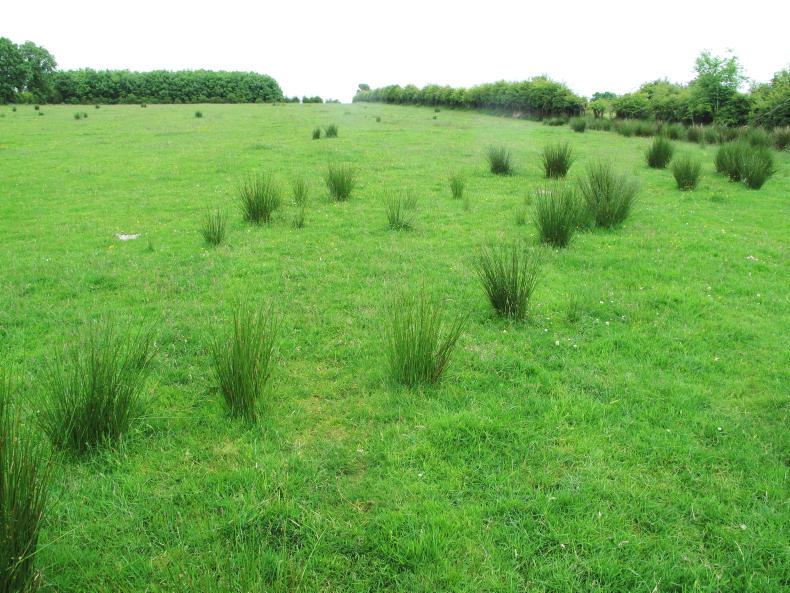It seems like every second week we are hearing about another agricultural product facing a ban of some description. The latest on the list is of course MCPA.
The Environmental Protection Agency (EPA) has warned that the herbicide could be banned by the European Commission unless farmers take greater care over how they use it.
In 2014, 28 water schemes were found to have exceeded the legal level of pesticides. This rose to 61 water schemes in 2015, with preliminary results for 2016 said to show similar to 2015 levels.
Water schemes
MCPA was the chemical detected in 41 of the 61 contaminated water schemes. There are approximately 850 water schemes in Ireland.
If we can’t clean up our act then there is a real possibility the MCPA could be banned at Irish or European level.
So, what’s going wrong? Obviously MCPA is used mostly on rushes and rushes tend to grow in wet marshy areas.
So, if the product is used in any way incorrectly the likelihood of traces ending up in water courses and in drinking water are quite high. The legal tolerance is also very low.
A single drop of MCPA in an Olympic size swimming pool would be enough to contaminate the water.
Since the introduction of the Sustainable Use Directive a couple of years ago anyone undertaking to spray herbicides of pesticides must complete a training course.
Therefore, the level of knowledge of application rate sprayer calibration etc. should be greatly enhanced.
For the most part, I feel that best practise is followed but the old school way of thinking is still around too.
If the product label says to apply at four litres per hectare, there are still those who decide to apply it at six litres per hectare.
Obviously, a total waste of money and a danger to the environment.
Losing MCPA
If we were to lose MCPA, wetter areas of land are going to become a lot more difficult to keep in good farming condition.
The only other options available for the control of rushes is continuous topping or using glyphosate through a weed licker.
But as we know, glyphosate is coming under its own scrutiny in Europe and may not always be available.
The spray for leatherjackets was missed terribly in this part of the country this spring and if MCPA is to go it would probably be worse.
Responsibility
We as farmers need to take responsibility for our actions and try to make sure as much as is humanly possible that chemicals are not ending up in our drinking water.
A wise man once told me the best advice to give someone when dealing with chemicals or animal medicines was four letters: R T F L.
When I asked what the four letters meant he replied, “Read The F**king Label”. Enough said!
Farmer Writes: Moorepark positivity needed in beef farming
Farmer Writes: silage season yields a mixed bag
It seems like every second week we are hearing about another agricultural product facing a ban of some description. The latest on the list is of course MCPA.
The Environmental Protection Agency (EPA) has warned that the herbicide could be banned by the European Commission unless farmers take greater care over how they use it.
In 2014, 28 water schemes were found to have exceeded the legal level of pesticides. This rose to 61 water schemes in 2015, with preliminary results for 2016 said to show similar to 2015 levels.
Water schemes
MCPA was the chemical detected in 41 of the 61 contaminated water schemes. There are approximately 850 water schemes in Ireland.
If we can’t clean up our act then there is a real possibility the MCPA could be banned at Irish or European level.
So, what’s going wrong? Obviously MCPA is used mostly on rushes and rushes tend to grow in wet marshy areas.
So, if the product is used in any way incorrectly the likelihood of traces ending up in water courses and in drinking water are quite high. The legal tolerance is also very low.
A single drop of MCPA in an Olympic size swimming pool would be enough to contaminate the water.
Since the introduction of the Sustainable Use Directive a couple of years ago anyone undertaking to spray herbicides of pesticides must complete a training course.
Therefore, the level of knowledge of application rate sprayer calibration etc. should be greatly enhanced.
For the most part, I feel that best practise is followed but the old school way of thinking is still around too.
If the product label says to apply at four litres per hectare, there are still those who decide to apply it at six litres per hectare.
Obviously, a total waste of money and a danger to the environment.
Losing MCPA
If we were to lose MCPA, wetter areas of land are going to become a lot more difficult to keep in good farming condition.
The only other options available for the control of rushes is continuous topping or using glyphosate through a weed licker.
But as we know, glyphosate is coming under its own scrutiny in Europe and may not always be available.
The spray for leatherjackets was missed terribly in this part of the country this spring and if MCPA is to go it would probably be worse.
Responsibility
We as farmers need to take responsibility for our actions and try to make sure as much as is humanly possible that chemicals are not ending up in our drinking water.
A wise man once told me the best advice to give someone when dealing with chemicals or animal medicines was four letters: R T F L.
When I asked what the four letters meant he replied, “Read The F**king Label”. Enough said!
Farmer Writes: Moorepark positivity needed in beef farming
Farmer Writes: silage season yields a mixed bag






 This is a subscriber-only article
This is a subscriber-only article










SHARING OPTIONS: